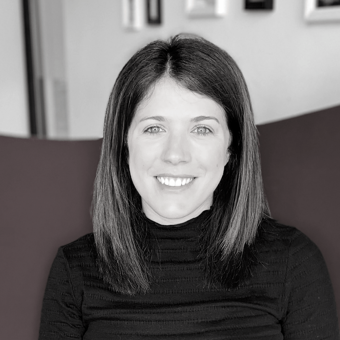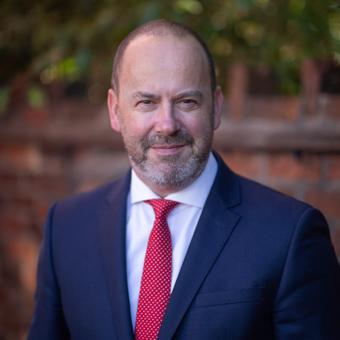Iain discusses his leadership style, juggling his client work and firm duties, agile working and much more.
What’s been your career path and when did you take over as managing partner?
I trained at Eversheds in Nottingham and qualified into the corporate team there. I moved to Browne Jacobson in 1993 when I was two years qualified. I continued to do corporate work, primarily for the larger corporates the firm acted for. I became managing partner on 1st May 2009. It seems a scarily long time ago already, but let’s just say it was an interesting time to be handed the reins.
I have to be honest and say becoming managing partner wasn’t something which I had particularly aspired to. I’ve never been someone who maps their life out in front of them, and there was quite a bit of arm-twisting done to persuade me to stand at that point in my career, but I am glad I did stand and I hope those that encouraged me to at the time are too.
Has the firm changed much under your leadership?
Maybe not for me to say! Firstly, whilst it might have happened while I am in my current role, none of the changes would have happened without the people I work with – at all levels and across all offices.
It is almost hard to compare the business now and then. At that time we were half the size we are now and only in three locations: Nottingham, Birmingham and London – and only the Birmingham office is still located in the same place (albeit substantially refurbished), so it was much easier to know people and to get around the offices. We now have Manchester and Exeter added to the network and the offices in Nottingham and London are so different from the ones we had. Manchester has already moved once in that time too, to its current home at Tower 12 before the ‘proper’ move to No. 1 Spinningfields later this year.
Whilst the increased size and scope of the organisation does mean we have to introduce more structure and formality, I hope we have managed to retain the feel and culture which we have always had.
For me though, the main changes are less about offices and people numbers than around the nature of the clients we are working for, the quality of work we are delivering and the people we attract to work with us as a result of that.
Understanding our clients and their markets better, achieving better collaboration between teams and making the most of the complimentary expertise we have across our sectors (health, public, private, insurance, education) has transformed the business.
How tough is it to juggle your client work with your duties as managing partner?
It isn’t, as I don’t do any client work and haven’t now for a long time. I do occasionally get asked for a second opinion or to review some drafting – which makes me a bit misty-eyed! I keep in touch with key clients though, primarily to get feedback on the service they are receiving from us, which is always invaluable, especially when those clients have legal panels and can compare levels of service. It is also good to catch up with people in other leadership roles and to compare challenges.
What are the biggest challenges & opportunities moving forward?
The biggest challenge is trying to anticipate how the market will shift over the short and longer term (for example how will AI really start to impact on law firms and how do we embrace that?) and how do we best differentiate ourselves to thrive in that market.
Ultimately though the key, whatever the future holds, is to attract, develop and retain the best people – in a supportive and creative environment - so we can achieve even stronger relationships with, and provide better support to, our clients.
How much collaborative working is there between the offices?
We believe a key factor in our growth over recent years has been the level of collaboration we achieve, whether that is across offices, sectors or departments. The more you can get people away from working in silos the better.
The Manchester office is pioneering a new agile working environment. Can you tell us a bit about that?
Firstly, it’s called ‘mogility’. Now I know people have wondered if we paid someone a fortune to come up with that, but the fact is that in discussing what we meant by an agile and mobile working environment, someone got their words muddled and ‘mogility’ was created and it has stuck!
Mogility is about promoting flexibility and having the most productive working environment we can. It is recognising that not everyone works in the same way or wishes to be sat at the same desk, all day, every day. For example many of our lawyers are out visiting clients or in court on any given day so it makes sense not to have assigned desks that are simply unoccupied. It also encourages new relationships to be developed both within offices and as others visit the office. The approach is combined with and supported by the best technology.
Are you seeing benefits and is it something you’d look to roll out across the firm?
Firstly it has gone down really well in the team in Manchester – even amongst the sceptics (and you know lawyers can occasionally be quite sceptical…) – to the extent that they are now proclaiming the benefits to our other offices.
We are looking at how we roll this out to other offices, but acknowledge that it is not one size fits all – and that it is easier to convince people to change their ways when it is combined with a new office move! Ultimately though we do want to make the best use of the space we have whilst creating the best working environment we can.
Can you give an example of how you invest in your people?
By listening: for example, we held two days in the summer where everyone was invited to an event (combined with a summer fete/fun-fair theme – I didn’t quite realise how much I would become target practice on the dodgems) where we asked for input across a range of key topics. We have also just undertaken a people survey of everyone, where we got an 80% response rate. People particularly seemed to enjoy the ‘If you could change one thing...’ question! We have had some great feedback now, which we will be acting upon.
Is there anything else you want to achieve in your own career?
I said at the start that I never had a master-plan, so neither do I know what I want to do next (or when ‘next’ will be); however, we are just completing a strategic review and we are all aligned that we want to be known as one of the best employers in the sector, and alongside that one of the best employers in each of the places in which we operate. We know there is a fair amount of work to be done to achieve that, but are committed to making it happen, so that as and when I do step down, that would be a fantastic legacy.
Finally, what inspires you?
I know it is such an obvious answer, but it is people. Part of the reason I was encouraged to become managing partner in the first place was because I enjoy talking to people and hearing what they have to say. It is all too easy to get bogged down in day to day issues and not to spend enough time in the business talking to people. Outside work, it is family - Jo and the kids (all five of them…), travelling (I was lucky enough to have a sabbatical with the family last summer), music (you can’t beat live music – usually by bands no-one has heard of) and sport (although supporting Norwich City gives precious little inspiration at the moment!).












